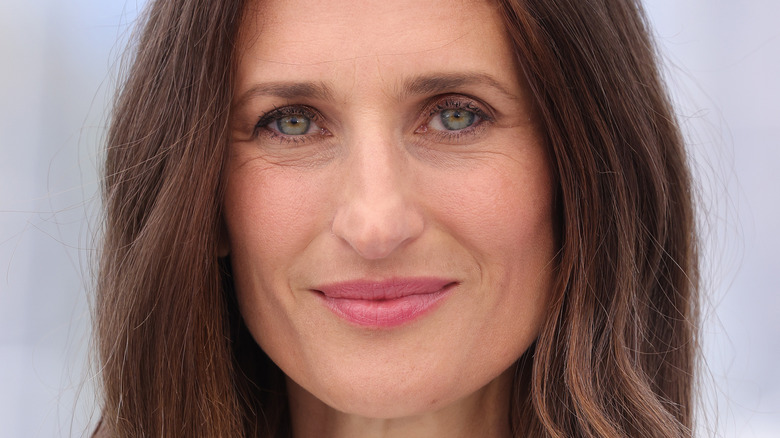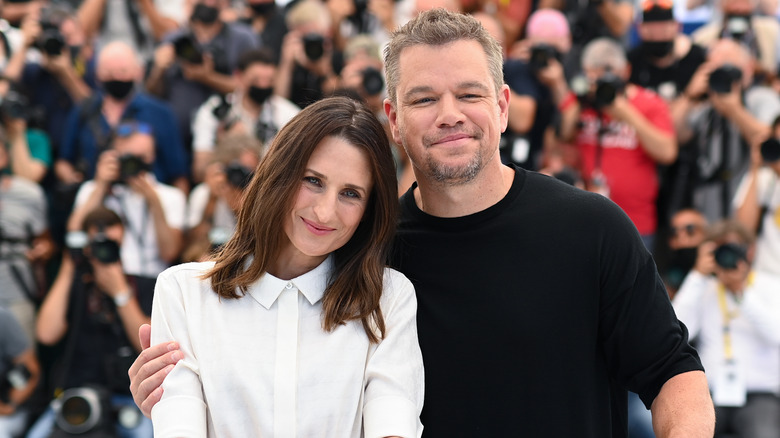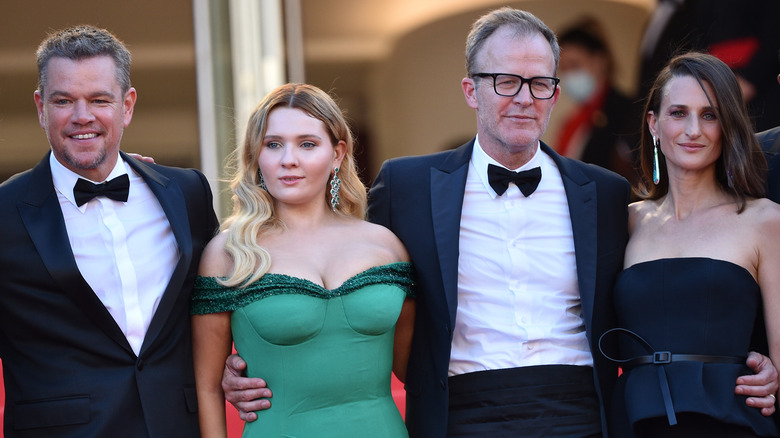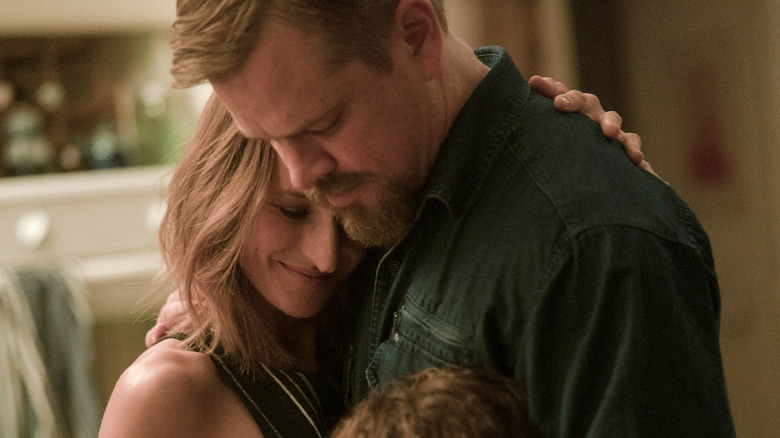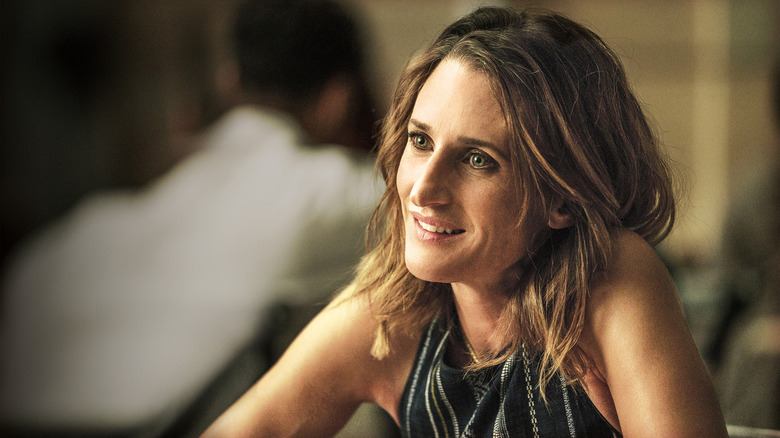Stillwater Star Camille Cottin Answers All Our Questions About The Film - Exclusive Interview
Actor Camille Cottin has already taken over every television set in her home country of France, and now this big star is blowing up the big screen on every single continent. Today, you can catch her as part of an Academy Award-winning cast in "Stillwater."
The dramatic film, directed by Oscar winner Tom McCarthy, follows an American named Bill Baker (played by Matt Damon) as he visits his daughter Allison (played by Abigail Breslin) who has been accused of murder. This father is willing to do whatever it takes to prove her innocence and free her from her prison cell in Marseille, France — and that's where Cottin's character comes in. Virginie is his local guide, helping him to navigate an unfamiliar country and even bestowing some wisdom upon him along the way.
Behind the scenes, few know that creating the film's characters was an extremely collaborative effort, and we got the chance to sit down with Cottin to get the inside scoop on the experience. In an exclusive interview with The List, she told us all about her unique audition, what it was like working with Matt Damon, and exactly how she feels about the ending of the film.
Camille Cottin shares how she landed a role in Stillwater
What was it about "Stillwater" that made you want to be a part of it?
Well, I was a big, big fan of Tom McCarthy cinema, so really, the idea of working with him was something like a gift. And then I really loved the script. He wrote it with some French writers who are very, very talented French writers whose work I really like. And yes, I have to say that I was also very sensitive to — I don't know if they realized how feminist it was, but it's a man who's wandered and lost, and really it's the women around him who help him open his mind and find the light. And so I think this is something that moved me and that touched me. And of course, working with Matt Damon was also something I was really, really excited to do and to experience.
How did you get involved in the film and find out that you had landed the role of Virginie?
It was a casting. It was really a casting, and yeah, the executive producer, she knew, called my agent, but Tom, he didn't know it by the time I was cast. And so I just — yeah, I auditioned among other actresses, and this is what I really loved about Tom is that I don't think I was in particularly the top of the list, but it was just working together. He was here during the audition, so it was really great because we worked for an hour, and he's an actor, and he's done some theater.
So working with him was really — it was more like a working session than an audition where people are just sitting, and you have to deliver a result, and then you go. It was really like he was building it with me, and we were together in the process, and I loved that. So really, when I came out of the audition I thought, "Okay, whatever happens now, we really shared a moment, an interesting moment, a creative moment, and I really enjoyed it," But that's what you think. And then the day after, you're like, "Oh, my God. I hope he's going to call back."
What it's like working with an award-winning cast
Was there anything that you learned, maybe from Oscar-winning director Tom McCarthy or the cast or just from your role that you've been able to apply to other characters you've played since?
I have to say that I was very, very sensitive to the concentration to, for example, Matt [Damon]'s concentration, how he was always in the energy of his character. So he's not a method actor in the sense that between the takes, he's himself, he's Matt Damon. He's not Bill anymore. But his concentration is such that the whole room is filled with his character, and the story. So there was something about building this family and this home together, and this — how could we say, this very — yeah, it's a very peculiar family, because it's first Bill and Maya's relationship that then leads to Bill's and Virginie's relationship. So we had to find the humanity of those characters and make them real.
And I think that it was — I just followed them. I followed him, and then I followed the little girl, whom I have to say, I was really blown away by — whose performance really blew me away. You know? And I expected that I would be in admiration for Matt Damon's work, and from Tom McCarthy's work, but actually, I was almost as dazzled as Maya [played by Lilou Siauvaud]'s performance as the others. And Abigail [Breslin]. Abigail, I just shared one day with her, of work, but she really [brought] the prison home, and I was really amazed at the work she did, because everything existed, and everything I hadn't seen in all the scenes, I hadn't seen, they were there, so yeah.
Out of everyone in the cast, Matt Damon completely transformed himself. I feel like he was almost unrecognizable on screen when he became Bill Baker.
He was.
What was your first thought when you saw him in character? Was it in a scene for the first time?
Yeah. Well, the thing is, we had a reading, and he was really Matt Damon, so he had his eyes, and then, so it was intimidating. But then as soon as we started shooting, he had his [goatee] and his costume, and then I always saw him like that, and so he became Bill. I completely forgot about Matt Damon. I mean, completely. Yeah. I mean, I was really facing Bill. And we shot almost chronologically, so we really had the time to build the relationship between those characters. And the first scene where we, when he opens the door, and he says, "Hi." We barely knew each other. So it was — and then when we were in the car, and I'm asking questions, and he doesn't answer, and everything was — it was the very beginning of the shoot, so it helped a lot, I think.
And you were in your home country of France to shoot this. What was the best part about that?
Yeah. It was great. It was funny because again it was like the story in the story, because — yeah. Yeah, so that was — but I have to say that I was also an outsider, because I didn't know Marseilles very well. I knew it a little bit, but I really enjoyed it, and I discovered the city, too, but it was nice because I was an outsider, and at the same time, I was a native, so it was interesting. Very interesting.
Did the actors ever go off script while filming Stillwater?
Was there ever a scene where director Tom McCarthy gave you guys the freedom to go off script?
Yeah. Yeah, definitely. Then he wanted to rewrite some things. So he said, like, for example, "Okay. Tomorrow, can you come? I want to shoot some more things." And for example, when Matt helps me rehearsing, or when I'm arguing with Maya, it's because he wanted to feel a home with more nuances, and some other moments of our everyday life. And this was not improvised, but it was decided on set. And I really like that because we had started shooting. Oh, yeah. So we knew our characters by that time, so it was really enjoyable, because you just have to trust him and let go, and so it was fun. I could have done that for much more if he wanted to.
He sounds really fun to work with. Like a great collaborator in that sense.
He's great. He's great. I don't know if it's because he's an actor, too, but the way he directs the scene he's really into the energy, and he always throws back the energy that he's received when he comes to you. When he gives you directions, you know, he's filled with that energy of the scene, and he's very precise and very demanding with himself. So you can only trust him, because you know that you're facing somebody who'll never let go if he is not satisfied, so.
Camille Cottin explains the ending of Stillwater
No spoilers, but I do want to talk about the ending of "Stillwater," because I was a little surprised the way the film ended for your character. When you first read the ending, were you surprised at all? And what kind of message do you hope viewers take away from the film?
Really? I thought she was — the ending is a very beautiful way of putting the last touch to this character and fully understand her, and it gives her all her strength, and I think that makes her a very strong figure. And it's very interesting, because she's very strong and being very soft at the same time. So, yeah, because normally when you have strong women, sometimes strong women express in a very direct way, and sometimes cutthroat or — you know what I mean?
Yeah, yeah.
With a disarming honesty sometimes. And she's very delicate, and very soft, and very warm. So her strength does not lie in — She's not a conflict person. Not at all. But this ending really shows all her strength, and that's about what happens when they argue in the movie. It's really an echo to that. There are limits that she does not want to cross, and it's a very, very strong matter for her. There are values that she strongly and firmly defends over her personal interest, and that's who she is. And so that's why I really like this ending, even though it's sad.
"Stillwater" is available today on digital, Blu-ray, and DVD.
